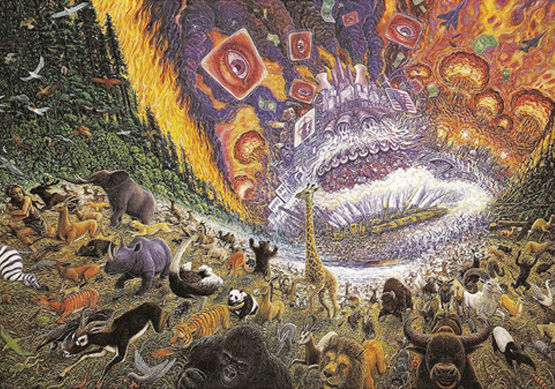Table of Contents
Overviews:
- LABOR
- Our social, cultural, and personal expectations are intricately and desperately caught up in the momentum of the existing global economy. Even should we be told in unqualified terms that industrialization must stop tomorrow or we pass the point of no return, headed straight for environmental collapse, we fear the cost of changing the economic machinery so much we would risk all to continue another day. No one feels this more intimately than the working class people. MORE.
- SUBSIDIES
- The use of government subsidies all around the world exposes painful contradictions between the policies espoused at international roundtables and those enacted on the economic playing field. More than $500 billion of taxpayers and consumers money is spent annually around the world supporting industrial methods that are hazardous to the environment. MORE.
- TRADE AGREEMENTS
- Just as national governments support environmentally detrimental subsidies, many international trade agreements also work in the opposite direction of sustaining our world. The General Agreement for Tariffs and Trade (GATT) that established the World Trade Organization (WTO) and current guidelines for international trade is a revealing example. MORE.
- BANKING PRACTICES
- The First World, led by the Group of Seven (G7), has funded Third World development over the last fifty years through a variety of commercial, multilateral, and bilateral loans. In the ideal, these development loans were to provide the wherewithal for the lesser developed countries to build infrastructure, social programs, schools, health services, a viable economy and, eventually, a place in the global market. What we have today is a gross perversion of that ideal. MORE.
- THE FINANCIAL MARKETS
- The deregulation of the financial markets combined with the high speed trading made possible by increasingly sophisticated computers has radically changed the world and expanded the power and reach of capitalist economics one hundred fold. Financial transactions can now occur at lightning speed. Money managers, reacting in the flash of a news bulletin to events any where in the world, can move money from one market to the next at the touch of a key. While there is clearly considerable advantage to the near instantaneous communication provided by the World Wide Web, the unfettered movement of large sums of private capital can be used like a weapon of stealth on developing nations and have far reaching political and social repercussions. MORE.
Related Articles:
- HUGO CHAVEZ AND THE BANK OF THE SOUTH
- Hugo Chavez is changing the economic and political landscape of South America. His plan for a new development bank of South America is a critical part of his vision.
- ALTERING THE TAO OF THE GREAT RIVER
- The world's largest hydroelectic dam is about to go online in the scenic Three Gorges of China's Yangtze River. Is this dam the capstone of progress in Asia or a huge environmental castastrophe in the making? Mud City Press takes its own unique look at the environmental and economic impact of China's Three Gorges Dam.
- THE REAL DEAL ABOUT ENRON
- And other provoking articles by visionary financier Catherine Austin Fitts
- ECOLOGICAL LANDSCAPING AND PERMACULTURE DESIGN
- The work and writings of permaculture designer Joshua Smith.
Many of the essays, stories, and reviews at Mud City Press are formated as ADOBE PDF files. If you don't have ADOBE's Acrobat Reader on your computer, you may download their free software at the ADOBE website.

